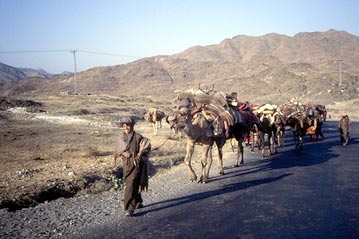Afghans accelerate voluntary repatriation from Pakistan's tribal areas
Afghans accelerate voluntary repatriation from Pakistan's tribal areas

PESHAWAR, Pakistan, August 23 (UNHCR) - The number of Afghans who have requested UNHCR help to repatriate from Kurram and Bajaur agencies has risen sharply as the government of Pakistan's August 31 deadline for closure of refugee camps draws near.
The government has given the 100,000 Afghans living in refugee camps in the two areas along the border with Afghanistan the choice of going home under the UNHCR voluntary repatriation programme or relocating to places it will designate elsewhere inside Pakistan.
By yesterday, 13,000 Afghans in Kurram had gone through all the UNHCR procedures to receive repatriation assistance - including taking an iris recognition test to ensure they had not previously received return aid - and departed for Afghanistan. Some 30,000 Afghans have registered so far in Kurram to return.
With it now clear that the camp closures will take place on August 31 as originally ordered, large numbers of Afghans in Bajaur have requested UNHCR assistance to repatriate. While only 400 had departed by yesterday, some 3,331 have registered with UNHCR to repatriate in the following days.
According to the census of Afghans in Pakistan conducted earlier this year, there were approximately 32,000 Afghans in camps in Bajaur and 70,000 in camps in Kurram. A further 21,000 Afghans lived outside camps in Bajaur and 48,000 outside camps in Kurram.
The closure of the camps, which completes the closing of all refugee camps in the Federally Administered Tribal Areas that began in 2004, was ordered by the government on security grounds. The army has been trying to tighten control in the border region, where tribal fighters are accused of infiltrating Afghanistan to battle the Kabul government.
The issue had been raised also at the meeting of the Tripartite Commission of the two governments and UNHCR, the agency which oversees repatriation. It was also discussed by Sardar Yar Mohammad Rind, Pakistan's Minister for States and Frontier Regions (SAFRON) which is responsible for Afghan refugees, during his recent visit to Kabul.
UNHCR has endorsed the decision both because security concerns in the area have obstructed the provision of assistance to refugees and because the government is preserving the opportunity for asylum by giving Afghans a choice of repatriating or relocating inside Pakistan.
UNHCR has assisted more than 2.5 million Afghans to repatriate from Pakistan since 2002. Each individual going home is eligible for transport assistance ranging from US$3 to $30, plus $12 to help in reintegrating inside Afghanistan.
As camps have been closed or consolidated, Afghans have been able to repatriate or move to other camps where there is now space because of repatriation.
The process began with the closing during 2003 and 2004 of temporary refugee camps that were established in 2002. Last year the consolidation was expanded to including older camps in FATA. UNHCR is ending assistance in two camps that the government ordered closed in Balochistan province this year.
The government has also ordered Afghans to leave the I-11 slum area of the capital, Islamabad, by September 10. A previous order issued in 2004 was extended for a year at the request of the government of Afghanistan. The residents have the choice of repatriation with UNHCR from the area, which is not a refugee camp, or relocation by the government to an existing refugee camp near the town of Mianwali.
By Jack Redden
UNHCR Pakistan







